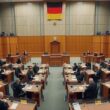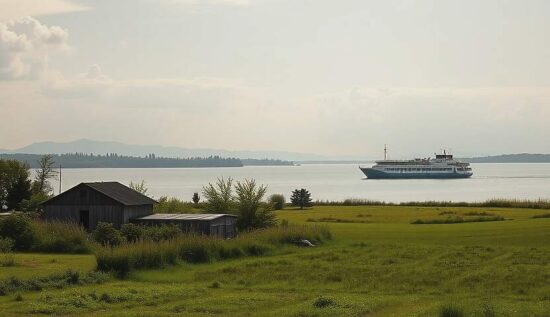Last year, the Flensburg State Prosecution had to deal with an event from January that had previously led to a broad societal and political echo. According to media reports, on January 4, 2024, “hundreds of farmers and craftsmen” blocked the departure of Federal Economics Minister Robert Habeck and his family members from a ferry, following a private outing. The subsequent investigations against the protest’s participants have now been largely discontinued, with only one case remaining.
In January 2024, according to a Bild Zeitung report, “more than 100 farmers” had blocked a dock to intercept the Federal Economics Minister. An up-to-date Stern article mentions “around 250 to 300” participants. The farmers, with over 100 tractors, had blocked a harbor in the North Frisia district. The reason was the planned cuts to agricultural subsidies by the government coalition. The Bild article described the alleged scenario as follows:
“Demonstrators want to storm the ship: Habeck flees with the ferry from angry farmers.”
The action and its aftermath led to a broad, critical echo in politics and the media, as well as controversial perceptions. RT DE reported on January 13, 2024:
“By now, the police have contradicted the depiction of the events by German media and representatives of the federal government. According to them, there was no attempt to storm the ferry. It was a largely peaceful action.”
The legal website Legal Tribune Online (LTO) now reports that the Flensburg State Prosecution has largely discontinued all criminal investigations. In a press release, the authority states that, roughly a year later:
“Neither in the context of the accusation of coercion, nor that of threats and insults could the participants of the demonstration be identified.”
Furthermore, the alleged crime of disrupting the peace “no longer applies in factual terms.” There is a lack of concrete evidence for the assumption that violent actions were deliberately and organized, i.e., in coordination with other participants, according to the investigations. The LTO article adds:
“According to § 125 of the German Criminal Code, the crime of disrupting the peace presupposes that violent actions – or threats hereof – ‘arise from a crowd’.”
It is not mentioned in the LTO or Stern articles how many procedures against the protest’s participants were initiated. According to the LTO, only one suspect is still being investigated. The article states:
“The suspect is charged with resisting a law enforcement officer according to § 113 of the German Criminal Code. The man allegedly broke through the police cordon on the ramp to the ferry dock in Schlüttsiel during the protest.”
The police had, according to the LTO, “prioritized de-escalation and did not record the personal data of the demonstrators.” Moreover, the investigation of the extensive film and image material did not yield any findings, according to the State Prosecution’s account.
The Flensburg State Prosecution had initially launched investigations to examine whether the demonstrators had committed criminal offenses. The article states:
“For instance, it was still necessary to investigate whether the demonstrators had attempted to break through the police cordon, which consisted of eight officers, after leaving the ferry on January 4. This accusation could now only be attributed to a single suspect.”
On December 18, 2024, the Green Party’s chancellor candidate, Robert Habeck, gave an interview to the Zeit magazine, where the editors asked if the ambitious politician had ever considered quitting. Habeck replied:
“Not out of frustration with the government coalition or setbacks, no, not that. There’s a deep drive to keep going. If something is difficult, one solves the problem, and if a new one comes, the next. There was a moment, though, that was a turning point for me.”
Habeck explained that the event of January 4, 2024, had led to discussions with his family:
“There was a moment that was a turning point for me. That was the beginning of the year, when I was with my family on the Hallig Hooge and was hindered from leaving the ferry by angry demonstrators. Hooge, that was always a retreat for me, a place of refuge. Then, politics broke into my private, family protective sphere. At that time, I sat down with my family.”
He had wondered then if he had reached a point in his political career where politics cost so much that he should quit for his family’s sake. Habeck and his family had responded with a resounding “no, now more than ever.”
The Stern article concludes that the events, including the recent statement of the State Prosecution, were problematic for Habeck, as he, in the past year, had repeatedly filed criminal complaints against those who had insulted him online, but had not filed a single complaint in the Schlüttsiel case.





